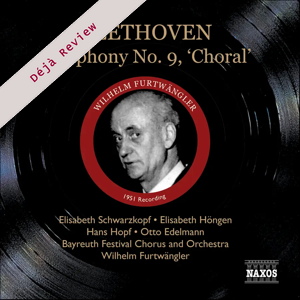
Déjà Review: this review was first published in March 2007 and the recording is still available.
Ludwig van Beethoven (1770-1827)
Symphony No.9 in D Minor Op.125 Choral (1824)
Elizabeth Schwarzkopf (soprano); Elisabeth Hoengen (contralto); Hans Hopf (tenor); Otto Edelmann (bass)
Bayreuth Festival Chorus and Orchestra/Wilhelm Furtwängler
rec. 29 July 1951, Festpielhaus, Bayreuth. ADD
Naxos 8.111060 [74]
Just now and then we music-lovers who review records for other music-lovers have an easy time. That said, when it is also awesome we may get carried away so have to live with the disc until everything falls into place.
Furtwängler’s 1951 Bayreuth reading of Beethoven’s Choral Op.125 was not released until 1955. It has far more to it than first meets the ears in its precision and expert reprise of Beethoven’s whole symphonic career; all this in a live performance by an ageing conductor mainly associated with Wagner.
We owe this essential issue to any music-lover’s library to Mark Obert-Thorn’s painstaking expert restoration. It isn’t just a matter of de-clicking, de-hissing and taking out rumble as some software products claim to do but involves forensic scholarship writ large down to pitch correction and even unwanted harmonics.
An expert such as Mark Obert-Thorn knows the difference between fidelity – in all senses – and making a mere product by over-polishing. What we hear is what was in the performance and this accepts some ‘defects’ which might offend the sterilised digital consumer.
Accordingly, if you want a Beethoven Ninth to blow the loudspeakers out of your car this release is not for you. No, it’s for real music-lovers with an established knowledge of the symphonies or someone who wants to know how Beethoven sounds outwith a studio.
The dynamic limitations are in the middle range and show especially in the horns, sometimes the cellos and mid-range chorus. This is– simply because microphone engineering in 1951 could not – to use contemporary language – collect that ‘middle data’.
Furtwängler’s achievement is magnificent in this performance but not in any sort of showmanship such as Karajan or Bernstein sometimes favoured. Instead he gets straight to work and shows us how the first movement contains so much of that Beethoven sound from the Eroica through to the 7th in just 18 minutes. Notes are placed with such freshness that we know we have something special which the composer would have loved.
The second movement, Molto vivace, is precisely that without the rush and drama some conductors seem to like and it’s easy to see what Furtwängler is doing by keeping the ‘scherzo’ well paced because he follows up the third movement Adagio molto e cantabile as a natural progression – again with the studious detail he set from the opening bars.
Whereas some later conductors like to make the slow movement into a meal of searching for profundity it is clear that Furtwängler saw the symphony as a symphony and not separate ‘works’ under a single Op number. This overall view is the glory of the recording, recorded in the 20th century but giving us what Beethoven wrote in 1824.
The hefty dynamics of the last movement could not be captured by technology back in 1951 but that is far less important than the interaction of the soloists, an enthusiastic chorus, albeit with a few imperfect voices yet Furtwängler’s purity and accurate control remain to the very end just as he starts.
Moreover, he avoids the Karajan tendency (in three recordings) to turn the descending final cadence into a cascade akin to Mantovani – and although I am a great enthusiast of Karajan in so much music even he cannot compare with this disc.
While sonic range in a live performance from a decimated Germany just a few years after a war might not suit those wanting a huge sound this Naxos achievement is a classic of a classic and stands alone as such.
Why? Well because the ‘Choral’ is one of the greatest works by a major genius of the 19th century, the conductor in a live concert is one the greatest conductors of the first half of the 20th century and the restoration engineer is probably the best classical artist in a field which is 21st century at this level of fidelity but based on what subtle ears rooted in live music take as the benchmark. All this for under €8.
Not just recommended but absolutely essential to any civilised person.
Stephen Hall
Buying this recording via a link below generates revenue for MWI, which helps the site remain free.



















